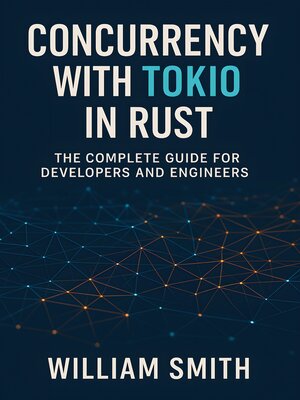Concurrency with Tokio in Rust
ebook ∣ The Complete Guide for Developers and Engineers
By William Smith

Sign up to save your library
With an OverDrive account, you can save your favorite libraries for at-a-glance information about availability. Find out more about OverDrive accounts.
Find this title in Libby, the library reading app by OverDrive.



Search for a digital library with this title
Title found at these libraries:
| Library Name | Distance |
|---|---|
| Loading... |
"Concurrency with Tokio in Rust"
"Concurrency with Tokio in Rust" is an authoritative guide to building efficient, robust, and scalable asynchronous systems using Rust's premier async runtime. From first principles, this book demystifies Rust's ownership model, lifetimes, and trait bounds like Send and Sync, laying a solid foundation for thread-safe and memory-safe concurrency. Readers are led through asynchronous programming essentials—including async/await, the Future trait, pinning, and error propagation—bridging the gap between synchronous and asynchronous design in modern Rust applications.
Delving into Tokio's runtime, the book articulates core execution models, such as multi-threaded and single-threaded schedulers, task lifecycle management, cooperative scheduling, and advanced instrumentation. Readers will explore sophisticated patterns for composing futures and streams, handling backpressure, racing and selecting tasks, and crafting fault-tolerant async data flows. Core synchronization and communication primitives—including async mutexes, channels, atomics, and deadlock avoidance—are presented with practical design strategies and performance analysis crucial for large-scale systems.
Further sections encompass real-world domains such as networking, protocol handling, high-concurrency service design, and system observability. Dedicated chapters focus on performance tuning, profiling, memory optimization, and debugging the most challenging concurrency bugs. The book concludes with integration techniques for combining Tokio with other async runtimes and the broader Rust ecosystem, reinforced through detailed case studies from industry, ensuring readers are well-equipped to deliver production-grade asynchronous Rust systems.







